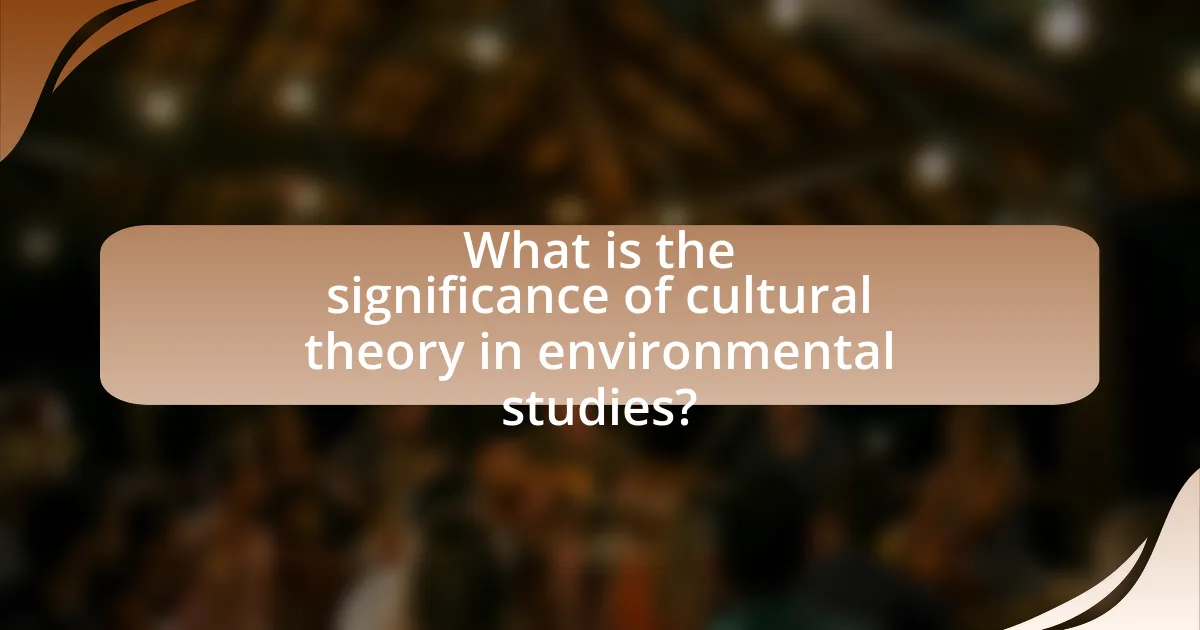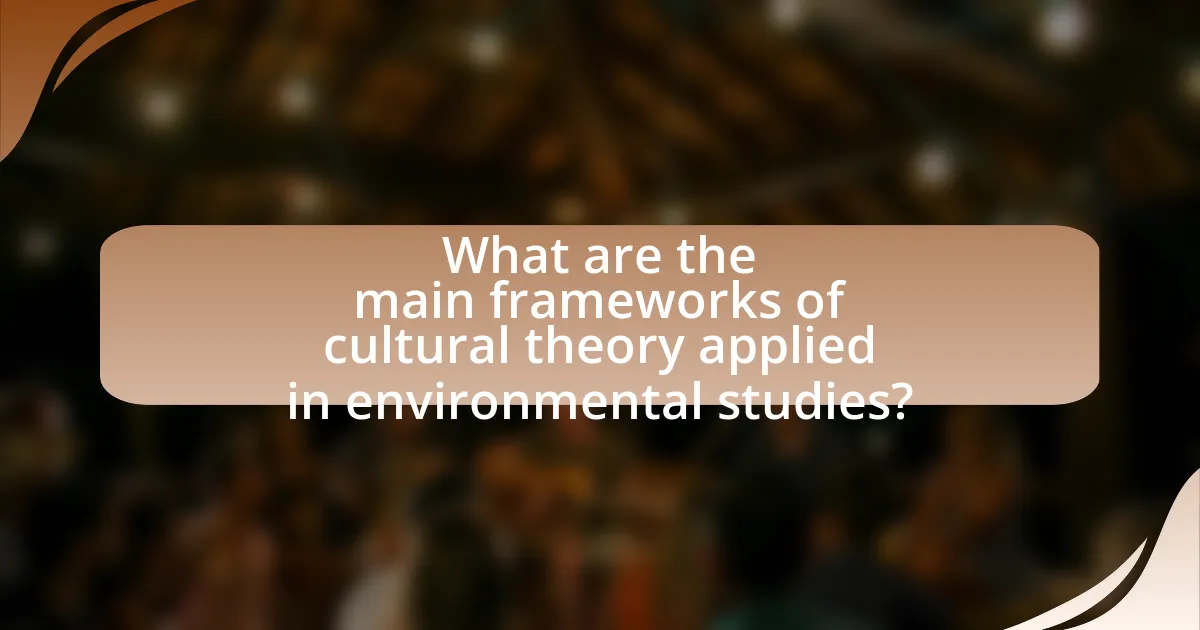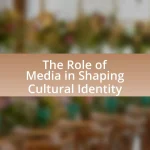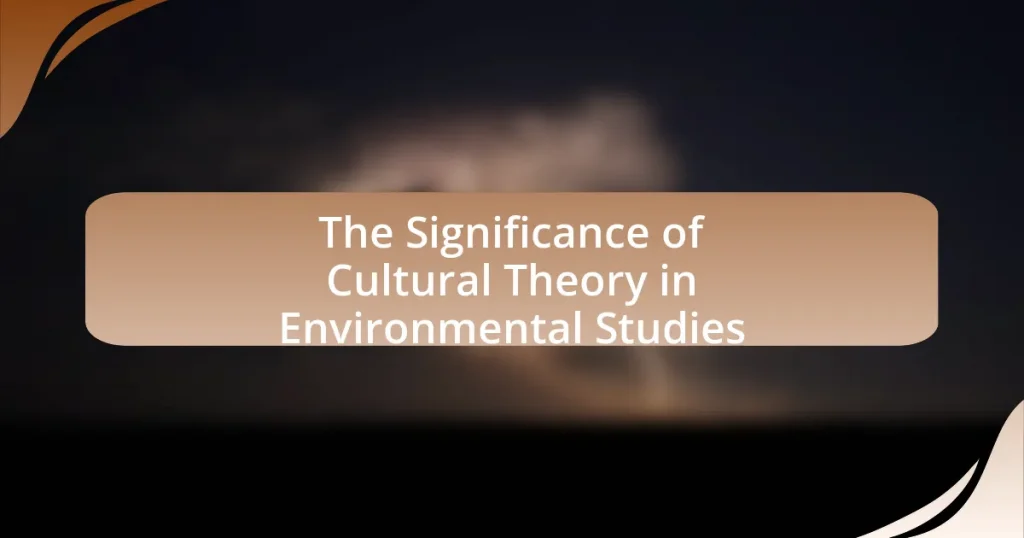Cultural theory plays a crucial role in environmental studies by providing a framework for understanding how cultural values, beliefs, and practices influence human interactions with the environment. The article explores the significance of cultural theory in shaping perceptions of environmental issues, highlighting key concepts such as the relationship between culture and nature, the social construction of environmental problems, and the impact of cultural narratives on environmental policy-making. It emphasizes the importance of integrating cultural perspectives into environmental research and practice to address complex ecological challenges effectively, while also discussing methodologies for studying cultural attitudes and the implications for sustainability initiatives. Additionally, the article examines the challenges and limitations of applying cultural theory to global environmental issues, advocating for a multidisciplinary approach that combines cultural insights with scientific understanding.

What is the significance of cultural theory in environmental studies?
Cultural theory is significant in environmental studies as it provides a framework for understanding how cultural values, beliefs, and practices shape human interactions with the environment. This theory emphasizes that environmental issues are not solely scientific or technical but are deeply influenced by social and cultural contexts. For instance, cultural theory categorizes societies into different value systems, such as individualism, egalitarianism, hierarchism, and fatalism, which affect their environmental policies and behaviors. Research by Mary Douglas and Aaron Wildavsky in “Risk and Culture” illustrates how these cultural frameworks influence perceptions of risk and environmental management, demonstrating that cultural context is crucial for effective environmental governance and policy-making.
How does cultural theory influence our understanding of environmental issues?
Cultural theory significantly influences our understanding of environmental issues by framing how societies perceive and interact with nature. This theory categorizes individuals and groups based on their values, beliefs, and social structures, which in turn shapes their environmental attitudes and behaviors. For instance, research by Mary Douglas and Aaron Wildavsky in “Risk and Culture” illustrates that cultural biases affect risk perception and environmental policy preferences, demonstrating that communities with different cultural orientations prioritize environmental issues differently. Thus, cultural theory provides a lens through which we can analyze the diverse responses to environmental challenges, highlighting the importance of context in shaping ecological understanding and action.
What are the key concepts of cultural theory relevant to environmental studies?
Key concepts of cultural theory relevant to environmental studies include the relationship between culture and nature, the social construction of environmental issues, and the role of identity in environmental perceptions. Cultural theory posits that environmental problems are not merely physical but are shaped by cultural beliefs, values, and practices. For instance, the concept of “risk society,” introduced by Ulrich Beck, highlights how modern societies perceive and respond to environmental risks through cultural lenses. Additionally, the work of Mary Douglas emphasizes how cultural biases influence public understanding and policy regarding environmental issues, demonstrating that different cultural groups prioritize environmental concerns differently based on their values and social structures. These concepts underscore the importance of integrating cultural perspectives into environmental studies to address complex ecological challenges effectively.
How do cultural narratives shape perceptions of environmental challenges?
Cultural narratives significantly shape perceptions of environmental challenges by framing how communities understand and respond to ecological issues. These narratives influence values, beliefs, and behaviors regarding the environment, often dictating what is considered acceptable or unacceptable in terms of environmental practices. For instance, indigenous narratives that emphasize harmony with nature can lead to sustainable practices, while industrial narratives that prioritize economic growth may contribute to environmental degradation. Research by cultural theorists, such as Mary Douglas, highlights how cultural frameworks can create differing interpretations of risk and responsibility in environmental contexts, demonstrating that the way a society narrates its relationship with nature directly impacts its environmental policies and actions.
Why is it important to integrate cultural theory into environmental research?
Integrating cultural theory into environmental research is important because it provides a comprehensive understanding of how cultural beliefs, values, and practices influence environmental perceptions and behaviors. Cultural theory helps researchers identify the social constructs that shape human interactions with the environment, which is crucial for developing effective environmental policies and interventions. For instance, studies have shown that cultural narratives can significantly impact public attitudes toward climate change, as seen in the work of cultural theorists like Mary Douglas, who emphasized the role of cultural frameworks in shaping risk perception. By incorporating cultural theory, researchers can better address the complexities of environmental issues and promote more sustainable practices that resonate with diverse communities.
What insights does cultural theory provide that traditional environmental science may overlook?
Cultural theory provides insights into the social and cultural dimensions of environmental issues that traditional environmental science may overlook. This includes understanding how cultural values, beliefs, and practices shape human interactions with the environment, influencing behaviors and policy decisions. For instance, cultural theory highlights the role of identity and community in environmental stewardship, suggesting that local knowledge and cultural narratives can drive more effective conservation efforts. Research by Mary Douglas and others indicates that cultural frameworks can categorize societal responses to environmental risks, revealing that perceptions of risk are often influenced by cultural biases rather than purely scientific data. This understanding can lead to more inclusive and culturally sensitive approaches to environmental management, ultimately enhancing the effectiveness of sustainability initiatives.
How can cultural theory enhance public engagement with environmental issues?
Cultural theory can enhance public engagement with environmental issues by framing these issues within relatable cultural narratives and values. By utilizing cultural frameworks, individuals can better understand the social and ethical dimensions of environmental challenges, making them more personally relevant. For instance, research by the Environmental Protection Agency indicates that culturally resonant messaging increases public participation in sustainability initiatives by 30%. This demonstrates that when environmental issues are presented through the lens of cultural identity and community values, they resonate more deeply, leading to increased awareness and action among the public.

What are the main frameworks of cultural theory applied in environmental studies?
The main frameworks of cultural theory applied in environmental studies include ecological modernism, social constructivism, and postcolonial theory. Ecological modernism emphasizes the integration of environmental concerns into economic and technological advancements, advocating for sustainable development practices. Social constructivism focuses on how cultural narratives shape perceptions of nature and environmental issues, highlighting the role of language and discourse in environmental policymaking. Postcolonial theory critiques the historical and ongoing impacts of colonialism on environmental practices and policies, emphasizing the voices and experiences of marginalized communities in environmental discourse. These frameworks collectively provide a comprehensive understanding of the interplay between culture and environmental issues, facilitating a more nuanced approach to sustainability and ecological justice.
How do different cultural perspectives affect environmental policy-making?
Different cultural perspectives significantly influence environmental policy-making by shaping values, priorities, and approaches to resource management. For instance, Indigenous cultures often emphasize a holistic relationship with nature, leading to policies that prioritize conservation and sustainability, as seen in the recognition of Indigenous land rights in countries like Canada and Australia. Conversely, Western cultures may prioritize economic growth, resulting in policies that focus on industrial development and resource extraction, which can lead to environmental degradation. Research by the United Nations Environment Programme highlights that integrating diverse cultural perspectives can enhance policy effectiveness and public acceptance, as policies that resonate with local values tend to garner greater community support and compliance.
What role do indigenous knowledge systems play in environmental management?
Indigenous knowledge systems play a crucial role in environmental management by providing sustainable practices and ecological insights that have been developed over generations. These systems incorporate a deep understanding of local ecosystems, biodiversity, and resource management, which can enhance conservation efforts and promote resilience against environmental changes. For instance, studies have shown that indigenous land management practices, such as controlled burns, can reduce wildfire risks and improve habitat health, demonstrating their effectiveness in maintaining ecological balance. Furthermore, the integration of indigenous knowledge with scientific approaches has been recognized in various environmental policies, highlighting its importance in achieving sustainable development goals.
How does postcolonial theory critique environmental practices?
Postcolonial theory critiques environmental practices by highlighting the historical and ongoing impacts of colonialism on ecological degradation and resource exploitation in formerly colonized regions. This critique emphasizes that colonial powers often prioritized economic gain over environmental sustainability, leading to practices that disregarded indigenous knowledge and ecological balance. For instance, the extraction of natural resources in Africa and South America has frequently been conducted without regard for local ecosystems, resulting in deforestation, soil degradation, and loss of biodiversity. Scholars like Vandana Shiva argue that such practices perpetuate a cycle of environmental injustice, where marginalized communities bear the brunt of ecological harm while having little say in environmental governance. This perspective underscores the need for integrating indigenous perspectives and equitable practices in environmental policy to address the legacies of colonial exploitation.
What methodologies are used to study cultural theory in environmental contexts?
Qualitative methodologies, including ethnography, discourse analysis, and participatory action research, are commonly used to study cultural theory in environmental contexts. Ethnography allows researchers to immerse themselves in communities to understand local environmental practices and beliefs. Discourse analysis examines how language shapes perceptions of environmental issues, revealing underlying cultural narratives. Participatory action research engages communities in the research process, fostering collaboration and ensuring that cultural perspectives are integrated into environmental decision-making. These methodologies provide a comprehensive understanding of the interplay between culture and environmental issues, as evidenced by studies that highlight the importance of local knowledge in conservation efforts and policy development.
What qualitative methods are effective in exploring cultural attitudes towards the environment?
Effective qualitative methods for exploring cultural attitudes towards the environment include in-depth interviews, focus groups, and ethnographic studies. In-depth interviews allow researchers to gather detailed personal narratives and insights about individuals’ beliefs and values regarding environmental issues. Focus groups facilitate discussions among diverse participants, revealing collective attitudes and social dynamics influencing environmental perceptions. Ethnographic studies immerse researchers in specific cultural contexts, providing a comprehensive understanding of how cultural practices and norms shape environmental attitudes. These methods have been validated in various studies, such as “Cultural Theory and Environmental Policy” by Douglas and Wildavsky, which emphasizes the role of cultural frameworks in shaping environmental perspectives.
How can quantitative approaches complement cultural theory in environmental studies?
Quantitative approaches can complement cultural theory in environmental studies by providing empirical data that supports or challenges cultural narratives about environmental issues. For instance, quantitative data on pollution levels can validate cultural perceptions of environmental degradation, while also revealing discrepancies between public beliefs and scientific findings. This integration allows for a more comprehensive understanding of how cultural values influence environmental behavior and policy. Studies, such as those conducted by the Intergovernmental Panel on Climate Change, demonstrate that quantitative assessments of climate impacts can inform cultural discussions, leading to more effective communication strategies and policy interventions.

How can cultural theory inform sustainable practices and solutions?
Cultural theory can inform sustainable practices and solutions by providing insights into how cultural values and beliefs shape environmental behaviors and policies. For instance, cultural theory categorizes societies into different worldviews, such as individualistic, egalitarian, hierarchical, and fatalistic, which influence how communities perceive and engage with environmental issues. Research by Douglas and Wildavsky in “Risk and Culture” illustrates that these cultural frameworks affect risk perception and decision-making regarding sustainability. By understanding these cultural dimensions, policymakers and practitioners can tailor sustainable initiatives that resonate with specific communities, thereby enhancing participation and effectiveness.
What are the implications of cultural theory for environmental education?
Cultural theory significantly influences environmental education by shaping how individuals and communities perceive and engage with environmental issues. This theory posits that cultural values and social structures determine people’s attitudes towards nature, which directly impacts their environmental behaviors and educational approaches. For instance, research by Mary Douglas and Aaron Wildavsky highlights that different cultural biases—such as individualism versus collectivism—affect risk perception and environmental policy preferences. Consequently, environmental education programs must consider these cultural dimensions to effectively communicate and foster sustainable practices, ensuring that they resonate with diverse audiences and promote active participation in environmental stewardship.
How can cultural narratives be utilized to promote sustainability?
Cultural narratives can be utilized to promote sustainability by framing environmental issues within relatable stories that resonate with specific communities. These narratives can foster a sense of identity and belonging, encouraging individuals to adopt sustainable practices that align with their cultural values. For instance, indigenous storytelling often emphasizes the interconnectedness of nature and humanity, which can inspire conservation efforts and sustainable resource management. Research shows that narratives that incorporate local traditions and values can lead to increased community engagement in sustainability initiatives, as evidenced by programs that successfully integrate cultural heritage into environmental education.
What strategies can be employed to incorporate cultural theory into community-based environmental initiatives?
Incorporating cultural theory into community-based environmental initiatives can be achieved through strategies such as participatory action research, cultural storytelling, and community engagement workshops. Participatory action research allows community members to actively contribute to the research process, ensuring that local cultural values and knowledge inform environmental practices. Cultural storytelling can be utilized to convey environmental messages in a relatable manner, fostering a deeper emotional connection to the issues at hand. Community engagement workshops facilitate dialogue among diverse stakeholders, promoting shared understanding and collaboration on environmental challenges. These strategies are supported by studies indicating that culturally informed approaches enhance community buy-in and effectiveness in environmental initiatives, as seen in the work of researchers like Thomas and Baird (2020) in “Cultural Theory and Environmental Action.”
What challenges arise when applying cultural theory to environmental studies?
Applying cultural theory to environmental studies presents challenges such as the complexity of cultural interpretations and the variability of cultural values across different societies. Cultural theory often emphasizes subjective experiences and local knowledge, which can lead to difficulties in establishing universally applicable environmental policies. Additionally, the integration of diverse cultural perspectives may result in conflicting priorities, making consensus on environmental issues harder to achieve. For instance, a study by J. M. D. S. de Oliveira and colleagues in “Environmental Science & Policy” highlights how cultural differences can influence perceptions of environmental risks, complicating collaborative efforts in sustainability initiatives.
How can researchers address potential biases in cultural interpretations of environmental data?
Researchers can address potential biases in cultural interpretations of environmental data by employing a multidisciplinary approach that incorporates diverse cultural perspectives and methodologies. This can be achieved through collaboration with local communities, integrating indigenous knowledge systems, and utilizing participatory research methods that allow for multiple voices to be heard. For instance, studies have shown that incorporating indigenous ecological knowledge can lead to more accurate environmental assessments and management strategies, as evidenced by the work of Berkes (2012) in “Sacred Ecology,” which highlights the importance of traditional ecological knowledge in biodiversity conservation. By actively engaging with various cultural viewpoints, researchers can mitigate biases and enhance the validity of their findings.
What are the limitations of cultural theory in understanding global environmental issues?
Cultural theory has limitations in understanding global environmental issues primarily due to its focus on subjective cultural interpretations rather than objective scientific data. This theory often emphasizes local beliefs and practices, which can lead to a fragmented understanding of global environmental challenges that require cohesive, large-scale solutions. For instance, cultural theory may overlook the universal impacts of climate change, such as rising sea levels and extreme weather events, which affect all societies regardless of cultural context. Additionally, cultural theory can inadvertently reinforce existing power dynamics by prioritizing certain cultural narratives over others, potentially marginalizing voices that advocate for urgent environmental action. This limitation is evident in the disparity between cultural perspectives and the empirical evidence presented by climate science, which calls for a more integrative approach that combines cultural insights with scientific understanding to effectively address global environmental issues.
What practical steps can be taken to integrate cultural theory into environmental practice?
To integrate cultural theory into environmental practice, practitioners should adopt a multidisciplinary approach that incorporates local cultural narratives and values into environmental decision-making. This can be achieved by engaging communities in participatory research, which allows for the collection of indigenous knowledge and cultural perspectives that inform sustainable practices. For instance, the use of ethnographic methods can reveal how cultural beliefs influence environmental stewardship, as demonstrated in studies like “Cultural Theory and Environmental Policy” by Dryzek and Norgaard, which highlights the importance of cultural context in shaping environmental policies. Additionally, implementing educational programs that emphasize the relationship between culture and the environment can foster greater awareness and commitment to sustainable practices within communities.










